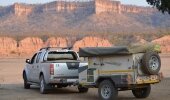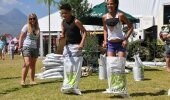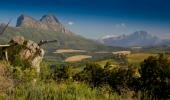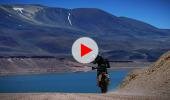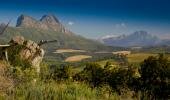Words: Sam Bradley ǀ Photos: Various photographers
We’re surrounded by the sights and sounds of nature: birds chirping and calling in an endless cacophony of sounds, bugs and butterflies fluttering about in a never-ending dance through the air, and the constant gurgling and chattering of the Riviersonderend stream as it splashes past us on its journey to the ocean. A few friends and I are in the Hottentots Holland Nature Reserve, a mere 90 km from Cape Town, although we may as well be on a different planet. The air seems cleaner and the sky bluer out here, with nature surrounding us in a dazzling kaleidoscope of colours.
This is no ordinary day out in the bush. Distracted by the beautiful surroundings, we’re forgetting that we are here on a mission, and rather a grand one at that. In a moment of courage (or madness, depending on how you view these things) we have decided to hike Suicide Gorge, an ominously named 17 km trail run through the Boland Mountains. Technically it isn’t hiking, but rather kloofing (also known as canyoning or gorging): following a river along its natural route using a combination of hiking, swimming, sliding, jumping, and boulder hopping. We will need all of these skills today, along with good doses of courage, enthusiasm, and adrenaline.
From the car park at Nuweberg Forest Station, it’s a beautiful 5 km hike through forest and mountain terrain until we meet up with the river. And it’s here that the fun begins. Taking the plunge into the first ice-fresh mountain pool, we wade slowly along, taking in the stupendous beauty surrounding us. The next inlet of water is a little way below us, and over time the water had smoothed the rocks into a natural slide, with most of us choosing to slip and slither our way down into the pool below. Just beyond that is a beautiful pond adorned with ferns and mosses - perfect for a snack break. Further on, there are still more pools and streams, which all merge together both in nature and our memories as we follow the river on its twisty, windy route through the reserve.
Before long we’re at an exhilarating section of the trail; a series of deep pools requiring a jump to get from one to the next. We launch ourselves into the first basin of water, whooping, and yelling all the way down like kids on a rollercoaster. The jumps range from 3 m to one of a whopping 14 m in height. Thankfully, there's a variety of ‘escape’ routes available that allow the daredevils in the group to do all the jumps, while the more cautious hikers can climb their way down or simply walk around the steeper sections. The river carries along like this for maybe 3 or 4 km, constantly offering up picturesque waterfalls, exhilarating jumps, calm mountain pools, and warm flat rocks (perfect for a quick nap in the sun), making the day pass in a happy state of contented smiles.
Just as the legs start to tire, we reach the pinnacle of the route and reason for the name of this trail: a 7 m jump that has to be conquered - but with no easy route walking around or climbing down. Even the more timid in our group had to pluck up their courage and take a leap of faith; most doing so with plenty of hesitation and many false starts. Jumps completed, it’s a short walk to the exit point.
From there, it’s an easy 5 km hike through beautiful mountain and fynbos to the end of the Suicide Gorge trail. By this time muscles are sore and bones are aching, but we’re still aware of the need to keep an eye out for the elusive leopards, which have been spotted in these mountains. It's ironic that an activity with such a sombre name is actually one of the most uplifting and exhilarating attractions the Cape has to offer.
What you need to know:
• General information - It is recommended to do the route with a guide, to make sure you don’t get lost and that all jumps are done safely and correctly. Hikers need to be reasonably fit to do Suicide Gorge, as 17 km of rough terrain takes a lot of time (about 8 hours hiking time) and energy, and there are sections where you need to climb or hop from rock to rock. For the less fit, there are other great hiking routes in the Hottentots Holland Nature Reserve that are not as extreme.
• What to take - Hikers should take shoes that can get wet and still be worn the whole day. A wetsuit and sunscreen are both advised, while a set of dry clothes in the car to change into afterwards is a good idea. Snacks, a warm jacket, and cell phone are needed in case of emergencies, as well as waterproof packaging to keep the cell phone dry. Waterproof cameras or GoPros are great for capturing the memories.
• Bookings - Can be made through CapeNature, www.capenature.co.za) between 1November and 30 April. Permits are R120 p.p. and can be paid at the gate. Excursions on Saturdays and Sundays must be booked a month in advance, while a shorter booking period is allowed for weekday excursions. A maximum of five groups of six people are allowed over weekends, with groups of 12 to 15 people allowed on weekdays. Make sure the weather is good before embarking on the trip.
• Directions - From Cape Town, take the N2, turn left at the Orchard Farm Stall in Grabouw and left again at the Villiersdorp/Franschoek junction. The entrance is at the Nuweberg Gate of Hottentots Holland Nature Reserve, which is 11 km from Grabouw on the R321.

